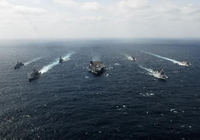The government of South Korean President Lee Myung-bak has adopted the catchphrase "Global Korea" to signify its desire to play a more assertive role as a contributor to the international community. The same aspiration is reflected in South Korea's emerging approach to global security issues as reflected in its 2008 Defense White Paper (.pdf), which states that in addition to maintaining stability on the Korean peninsula and building the foundations for national security and prosperity, a core national security objective is "enhancing competence and status internationally." This widening outlook is particularly striking to those who are accustomed to Korea's longstanding political and security focus only on things Korean.
Already a leading world economy, South Korea is a newly-minted member of the OECD's Donor Assistance Committee (DAC), and will be the first newly industrialized country to host a G-20 gathering of world leaders to assess global financial stability in November. So in many ways it is not surprising that South Korea has also begun to make contributions to international stability, including in areas far from the peninsula. Hand-in-hand with its aspirations as an international donor, South Korea is developing the capacity and desire to participate in maritime security, peacekeeping, and post-conflict stabilization missions.
South Korean investment in naval development is striking for a country of its size, and one that is surrounded by great powers. But given South Korea's high level of dependence on global trade, the development of an ability to contribute to maritime security is a logical development. South Korea launched its first 7,000-ton Aegis-equipped destroyer in 2007. Then in April 2009, in its first deployment outside the region, South Korea assigned a task group, including a 4,500-ton KDX II class destroyer, to the Gulf of Aden, where it has performed admirably as part of the U.S.-led TF-151 anti-piracy mission. This practical experience also strengthens U.S.-ROK alliance cooperation and South Korean experience in a multinational setting.

